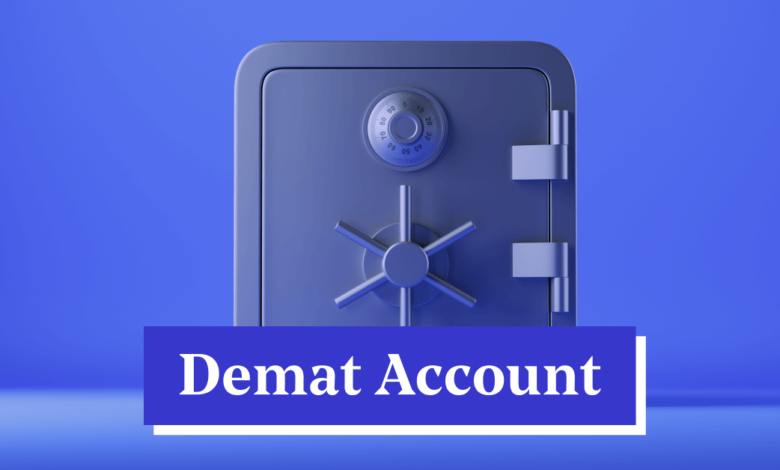Demat Account: A Must Need for All Those Who Love to Trade

Many are trying to profit from the current rise in the Indian stock market. But knowing one important component—the Demat account—is critical before entering the world of shares and stocks.
This blog post is your one-stop resource for everything about Demat accounts. It will cover their definition, significance, and ability to simplify your investing process.
Deciding on a Demat Account: From Paper Certificates to Digital Convenience
Imagine your bank account as holding your shares, bonds, and other financial products electronically rather than cash. That is a Demat account, which is essentially a digital investment repository. Demat accounts were introduced in 1996 and, by eliminating the laborious procedure of obtaining actual share certificates, completely changed the Indian stock market.
What Really is a Demat Account?
“Demat” is an acronym for “dematerialization,” the procedure of transferring actual shares to a digital format. Trading must be settled electronically, according to a requirement put down by the Securities and Exchange Board of India. A Demat account, therefore, becomes your essential partner for actively participating in the market.
What is a Depository?
All the securities you hold are safely stored in a depository. They store the securities when you buy and release the securities when you sell them. In India, the two main depositories are
- National Securities Depository Limited (NSDL)
- Central Depository Services Limited (CDSL)
Who are Depository Participants?
Your stockbroker, with whom you will open your demat account, is your depository participant. Since you cannot approach a depository directly, a stockbroker acts as the middleman between you and the depository to facilitate the transaction of securities.
Understanding the Demat and Trading Account Duo: Going Beyond Storage
A Demat account safely stores your investments, but buying and selling does not take place there. That requires a trading account. Consider it your online buy-and-sell-ordering portal.
Their responsibilities are outlined here in simple form:
Demat Account: Holds your shares, bonds, mutual funds and exchange-traded funds (ETFs) in electronic form: the demat account. Purchased shares are released upon sale.
Trading Account: The trading account is what makes it possible to buy and sell these securities actually. Your account is credited with the sale revenues and debited for purchases.
These accounts basically operate in concert. Your investments live in the safe that is your Demat account, but you may actively manage them in your trading account.
Who Is Eligible to Open a Demat Account?
It is easier to open a Demat account. Those eligible to take part are as follows:
- Indian Residents: A Demat account can be opened by everyone over the age of eighteen.
- Non-Resident Indians (NRIs): NRIs can also make stock market investments in India using a demat account.
- Domestic Companies: Demat accounts allow companies to keep their investments electronically.
- Hindu Undivided Family (HUF): A HUF can open a Karta (head)-named Demat account.
- Minors: Young people can open a Demat account in the name of a parent or guardian.
What are the documents required to open a Demat Account?
To open your Demat account, get the following documents after selecting a reliable broker:
- Pan card
- Aadhar card
- Canceled cheque with your name printed.
- Address proof
- Passport size photograph
Benefits of Opening a Demat Account
Multiple advantages of demat accounts increase the security, effectiveness, and economy of investing:
- Unmatched Security: Ditch the concerns about actual certificates getting lost, stolen, or damaged. Electronically, your investments are secure and easily available.
- Integrated Management: Your portfolio is easier to monitor and manage when all of your investments are housed in one location.
- Faster Settlements: Trade settlements used to take weeks to complete. T+2 settlements—with T the transaction date—are made possible by demat accounts far more quickly than by the previous 14-day procedure.
- Savings: Demat accounts do away with the handling and stamp duty costs related to actual certificates.
- Easy Updates: Your Demat account allows you to save time and work by updating your KYC (Know Your Customer) information across all of your assets.
- Easy Transfer: Bypassing the difficulties associated with actual shares, assets can be easily transferred to the nominee via the Demat account in the event of the account holder’s death.
Conclusion
Recall that your entryway to a world of investment options is a Demat account. With knowledge of its function and the related advantages, you can decide wisely and confidently to start your investing adventure. Happy Investing!



